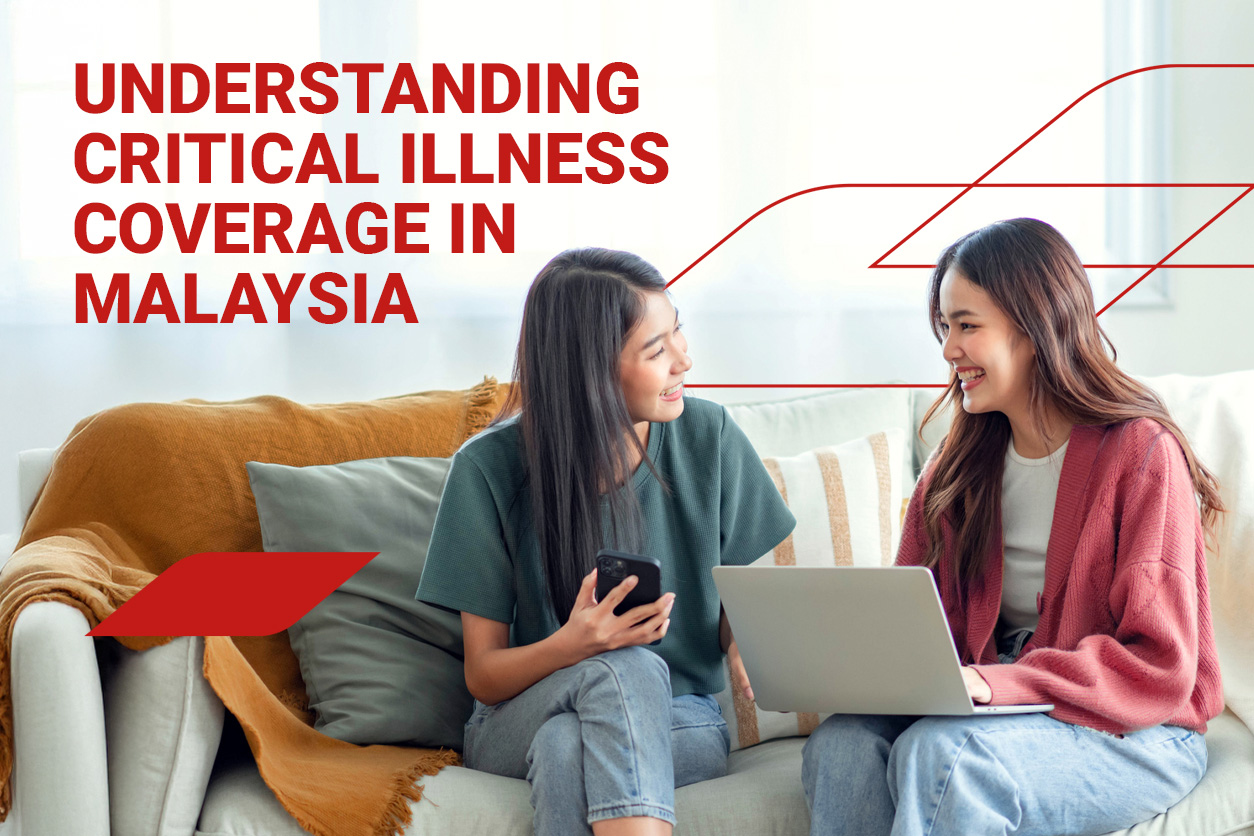< Back to Our StoriesUnderstanding Critical Illness Insurance Coverage in Malaysia


Critical illness insurance is a type of protection that provides a lump sum payout if you're diagnosed with a serious health condition, such as cancer, stroke, or heart disease. It’s not meant to cover hospital bills like a medical card does. Instead, the payout is yours to use however you need: medical treatment, lifestyle adjustments, or everyday living expenses.
Several Malaysian insurance providers offer critical illness plans that provide partial payouts for early-stage illnesses and full payouts for full diagnosed critical illness. However, the specific percentages and conditions vary significantly between providers and plans.
Each insurer may have a different list of covered illnesses, especially in the early stages. However, common conditions like cancer, heart attack, and kidney failure are usually included across most plans. It is best if you could read on their policy contract to understand better on what is being covered.
![]()
![]()
What Is Critical Illness Insurance?
If you get one of the serious illnesses covered in your critical illness (CI) insurance policy, the CI coverage provides the insured person with direct financial assistance, while medical insurance pays for medical expenses.
|
How It Works
|
Early Stage:
50% payout (upon survival of 7 days).
|
Advanced Stage:
100% of sum insured, less any Early Stage claim (upon survival of 30 days).
|
You can use this money to replace missed wages, home bills, or other expenses - whatever you need most at the time.
It's essential to review the conditions of your plan, as different insurance companies may have critical illness lists and definitions of ailments.
Common Critical Illnesses Covered in Malaysia
Every insurance company has its critical illness list of conditions that are covered. Most policies tend to include a core set of conditions. Below are some of the most commonly covered serious illnesses, along with explanations of what they mean and why coverage for them is essential.

Cancer
Cancer is the most common cause for inclusion on the critical illness list in Malaysia. It includes several types of malignant tumours, such as those that form in the breast, lung, colon, or cervix. Treatment can be costly and may take place over a long period, so it's crucial to receive financial aid as soon as possible.

Heart Attack
A heart attack happens when blood flows to a part of the heart is blocked, damaging the heart muscle. Recovery may involve lifestyle changes, long-term medication, or surgical procedures such as angioplasty or bypass surgery. It often requires extended medical care, making financial protection crucial during this period.

Stroke
A stroke occurs when the brain’s blood supply is interrupted, either by a clot or a burst blood vessel. It can result in speech difficulties, memory loss, paralysis, or long-term disability. Rehabilitation and physical therapy are often required, and having financial support can greatly reduce stress and help with recovery.
![]()
![]()
Why Should I Get Critical Illness Insurance?
Critical illness insurance provides a financial safety net while you recover. It helps cover expenses that go beyond hospital bills.
|
Key Benefits
|
Income Replacement:
If you're unable to work due to illness, the payout can help you cover your bills and everyday expenses.
|
Debt and Lifestyle Support:
Use the funds to pay mortgage, tuition, or other family obligations while you recover.
|
Recovery with Peace of Mind:
Financial security enables you to focus on healing, rather than worrying about bills.
|
Critical Illness (CI) insurance serves as a valuable complement to medical coverage. While medical plans typically cover hospitalisation and treatment costs, CI insurance offers a lump sum payout, providing financial support.
FAQ about Critical Illness Insurance by Generali Life Insurance Malaysia
How old do you need to be to apply?
Many plans accept applicants from as young as 15 days old up to 60 years old. Coverage typically continues up to the age of 80, depending on the policy terms.
Is critical illness insurance worth it?
Yes. It’s especially helpful if you rely on your income or have ongoing financial obligations. The lump sum payout helps you manage recovery-related costs or income loss during a serious illness.
Can I get critical illness insurance if I already have a medical card?
Yes. A medical card covers hospital bills, while critical illness insurance provides extra funds to support your lifestyle, recovery, or family if you're unable to work.
How long does the coverage last?
Most policies offer coverage up to a fixed age, commonly up to 80. The actual duration depends on the policy you choose.
How much will I pay in premiums?
Premiums are based on your age, health condition, and coverage amount. Some plans offer level premiums, while others adjust over time.
When does coverage begin?
Coverage typically starts after a waiting period. For example, some plans require 30–60 days before certain illnesses like cancer or stroke are covered.
What is the survival period?
You’ll need to survive a set period after diagnosis to qualify for a claim, often 7 days for early-stage conditions and 30 days for advanced stages, depending on the policy.
For full details, please refer to the eCritical Early Care brochure (PDF).
![]()
![]()
Getting Started with Critical Illness Coverage
Before buying a plan, consider a few key factors:
1. Number of Illnesses Covered
Look for plans that include both primary and early-stage conditions. A broader critical illness list may offer better protection.
2. Understand the Terms
|
Get familiar with
|
Waiting Period:
This is the time between when your coverage starts and when you can file a claim. It usually lasts for 30 to 60 days.
|
Survival Period:
The time you need to live after being diagnosed (usually 7 and 30 days for Early Stage and Advanced Stage, respectively).
|
Claim Conditions:
You must have specific documents or meet certain deadlines to file.
|
3. Evaluate Your Profile
|
Consider
|
|
Age and health history
|
Family medical background
|
Existing medical insurance
|
Financial commitments
(e.g., dependents, debts)
|
A younger policyholder usually pays a cheaper premium, so signing up early is a good idea.
Conclusion
Critical illness insurance is more than just a health product; it’s a way to protect your future and give yourself room to recover without financial strain. While medical insurance helps cover treatment, critical illness insurance gives you the time and resources to focus on what matters most: getting healthy.
Together, they create a tiered safety net, with critical illness and medical insurance protecting your income, supporting your family, and maintaining your peace of mind during recovery.
For lasting financial security, consider critical illness coverage from providers like GeneraliLife Insurance, offering a balance of affordability and comprehensive protection.
Explore our online critical illness plans at Let’s Go For Life and take the first step toward smart, confident coverage.

